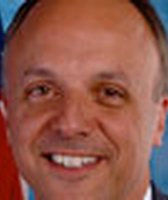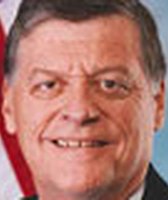Stand up for the facts!
Our only agenda is to publish the truth so you can be an informed participant in democracy.
We need your help.
I would like to contribute
Rick Scott says the stimulus didn't create a single private sector job
For Rick Scott, a Republican businessman running for governor, distinguishing himself from a Democratic competitor who also focuses on jobs is simple: He ties her to "President Obama’s agenda."
So at a Sept. 3, 2010, appearance before Tallahassee reporters, the Friday before Labor Day, he described how he differs from Alex Sink on job creation by mentioning Obamacare, the Bush tax cuts and the federal stimulus. When a reporter asked for specifics, he said:
"I think it's very simple. Higher taxes kill jobs. Regulations kill jobs. Obamacare is an unbelievable job killer. It's going to be devastating for our state. That by itself is going to make it very difficult for people to do business in our state. And the taxes, the increase in taxes for that is going to be devastating to our state.
"On top of that, my background is I put my money up. I took the risk. I stood up for what I believed in starting businesses. And that’s a whole different background than other people. But she clearly believes in higher taxes. She clearly believes in Obamacare. She clearly believes in the stimulus, and we know the stimulus has not created one private sector job."
We'll set aside for now his various claims about taxes, regulation and health care to focus on his parting blow: "The stimulus has not created one private sector job."
He's treading dangerous ground. In February, PolitiFact looked at a similar statement by Republican Sen. Scott Brown of Massachusetts, that the stimulus bill "didn't create one new job," and found it so ridiculous it earned a Pants on Fire ruling.
But Scott said "one private sector job." Does it help his case?
Since Scott's running to govern Florida, we'll focus on the stimulus' impact in his state, familiar ground. By stimulus, campaign spokesman Joe Kildea confirms, Scott means the American Recovery and Reinvestment Act of 2009. That federal money comes in three broad categories, such as funds to federal agencies spent through grants and contracts, funds for benefits such as unemployment and Medicaid, and tax relief, according to Don Winstead, the state’s stimulus czar.
For funding in the first category, there's a federal reporting system. Those who get funds must report how much they spend, and how many jobs are created or saved. According to the latest figures on the federal Recovery.gov website — just roll your mouse over Florida — the number of full-time equivalent jobs created or saved in the state just for the April to June quarter is 40,604. That number represents 79,365 actual workers, a state summary says.
While the reports don’t break out private sector jobs from public ones, it’s clear some of the jobs — and in some cases, most — end up with private sector contractors, said Winstead, special adviser to Gov. Charlie Crist on the economic stimulus. He produces the summary of Recovery Act information for the state. A table listing 2,951 full-time equivalent jobs created or saved under the U.S. Department of Transportation would largely represent private sector highway construction jobs, he said. On the other hand, the 27,815 listed under education would be largely public school employees. Public and private, the cumulative job impact for the state including tax relief is 167,000, his summary says. Meanwhile, a non-government analysis by data company Onvia at Recovery.org estimates the stimulus’ effect on jobs at 206,000.
That's certainly more than one! But wait ...
Scott campaign spokesman Kildea is quick to jump on such figures, pointing out that since the government tracks jobs "created or saved," it's hard to say how many have been "created," which is the word Scott used.
Additionally, the Recovery.gov reporting has acknowledged flaws. A May report from the U.S. Government Accountability Office says that while data from recipients of stimulus money are improving, "errors and reporting inconsistencies remain."
So we examined a specific stimulus-funded program, Florida Back to Work. It's paid for with funds from the Temporary Assistance for Needy Families Program -- established by the stimulus bill -- which may be spent on subsidized employment.
The program is operated by the Florida Agency for Workforce Innovation, which administers other benefit programs and tracks the unemployment rate. It got its federal funding in March, and reimburses employers for most of the costs of a new employee through Sept. 30, 2010. As of Sept. 10, it had paid for jobs for 5,324 new employees. It has also worked with employers to create 4,053 positions posted at employflorida.com and open to job-seekers.
So, are any of those private-sector jobs?
A summary from the agency lists more than 1,000 Florida employers who've agreed to create jobs using the program. Some are public, such as the Department of Children and Families in Okaloosa County. Others are nonprofits, such as Goodwill Easter Seals of the Gulf Coast. And yes, there are plenty of private companies, for example, Riviera Beach pharmaceutical manufacturer Sancilio & Co.
Alex Sancilio, a principal in the Palm Beach County company and director of human resources, has used the Back to Work program to make 27 new hires and keep 15 full-time employees. The company produces drugs and supplements, including children's vitamins and fish oil pills. She worked with the local workforce board to get resumes, and used the money to speed up hiring she might have otherwise spread out.
That's how she came to hire Billy Weston as an account executive. Weston, 48, was a car salesman who had been unemployed two months, which helped qualify him for the program. Sancilio says she wouldn't otherwise have invested in retraining someone who didn't have a pharmaceutical background.
"If we hadn't had the funding, we never would have given him the time to learn the skills," she said. "We're very, very happy."
So what does Scott's campaign have to say about Weston, a guy with a job in the private sector because of the stimulus?
"It's a ridiculous assertion that the stimulus has created jobs," Kildea said. "That's exactly the reason Floridians are so upset with the direction of the economy. No matter what sort of intellectual gymnastics used by Obama liberals, the fact is that when the stimulus was first signed, Florida's unemployment rate was 9.2% and today it is 11.6% and the state lost a net of almost 200,000 jobs."
So, because more jobs were lost overall than gained, that's the same as saying not one job has been created?
Not according to Rebecca Rust, senior economist for the Agency for Workforce Innovation. In fact, it's standard to talk about jobs gained, even when jobs lost may be greater.
"There's churning in the job market," she said. "Employers are adding and cutting at the same time. … Just because we have a job loss, you can't say we haven't gained any stimulus jobs. What you could say is that the job losses could have been greater."
Sean Snaith, a University Of Central Florida economist who has been critical of the effect of the stimulus, agrees that saying "the stimulus has not created one private sector job" is inaccurate.
"I think that's an exaggeration of the reality, which is that it didn't do very much for private sector hiring," he said. "But surprise, surprise, in politics there's hyperbole sometimes."
It's more than hyperbole to Billy Weston. Here’s his reaction to Scott’s statement:
"I disagree. I have to. Even though, you know, I'm a devout Republican, that's absolutely wrong," he said. "I'm living proof that this helped out, tremendously. I couldn't agree with that statement whatsoever. I know, due to this program, I have a job at Sancilio & Co. That's the reality of it."
Beyond Florida, there are examples Scott ought to be familiar with. Take telecommunications company XFone, which announced in March that it received $63 million in federal stimulus money. Scott owns about 15 percent of the company, campaign spokesman Chad Colby said. On Sept. 13, 2010, a Louisiana subsidiary, Pride Network Inc., got approval for $36 million in additional stimulus funding — money it estimates will create 1,300 jobs.
Colby says Scott’s a minority investor, doesn’t sit on the board, and doesn't control any operations of the company. "His position on stimulus hasn't changed," Colby said. "If the argument is that the stimulus is the only way to create jobs, it's false."
But that isn’t Scott’s statement. In the face of Billy Weston and now 1,300 jobs at a company Scott partly owns, his campaign still hasn’t moved from its stance that "the stimulus has not created one private sector job." He may disagree that the stimulus is the most effective use of funds, or argue as Snaith does that "it didn't do very much." But those aren’t the words he chose.
With thousands of Floridians employed because of stimulus-funded programs — not to mention jobs for a company in which Scott owns stock — we rate his statement Pants on Fire.
Featured Fact-check
Our Sources
Press corps interview with Rick Scott, St. Petersburg Times-Miami Herald, Sept. 3, 2010
PolitiFact, "The stimulus bill 'didn't create one new job,' " Feb. 18, 2010
Interview and e-mails with Joe Kildea, spokesman for the Rick Scott campaign, Sept. 13-16, 2010
E-mail from Don Winstead, special adviser to Gov. Charlie Crist on economic stimulus, Sept. 13, 2010
Interview with Don Winstead, special adviser to Gov. Charlie Crist on economic stimulus, Sept. 16, 2010
Recovery.gov, accessed Sept. 16, 2010
Recovery.org, accessed Sept. 16, 2010
Florida Recovery Act Summary as of July 30, 2010, via Don Winstead, Sept. 13, 2010
"Estimated effect on jobs" at Recovery.org , a service of Onvia, accessed Sept. 16, 2010
Recovery Act: States’ and Localities’ Uses of Funds and Actions Needed to Address Implementation Challenges and Bolster Accountability, GAO Report, May 2010
Agency for Workforce Innovation's Florida Back to Work Program fact sheet
Agency for Workforce Innovation's Back to Work Proposal Summary, via spokesman Robby Cunningham, Sept. 14, 2010
Interview with Alex Sancilio, principle and director of human resources for Riviera Beach pharmaceutical manufacturer Sancilio & Co., Sept. 14, 2010
Interview with Billy Weston, account executive for Riviera Beach pharmaceutical manufacturer Sancilio & Co., Sept. 14, 2010
Interview with Rebecca Rust, chief economist with the Agency for Workforce Innovation, Sept. 15, 2010
"Floridians Wonder: What’s A ‘Fair Share’?" Sarasota Herald-Tribune, Aug. 7, 2010
Interview with Sean Snaith, director of the Institute Of Economic Competitiveness at the University Of Central Florida, Sept. 14, 2010
"Review of Rick Scott's financial holdings shows complex network beyond his reported net worth," St. Petersburg Times, July 3, 2010
Interview with Chad Colby, spokesman for the Scott campaign, Sept. 16, 2010
PolitiFact Florida, "'My 7-step plan' creates 700,000 jobs in 7 years." July 25, 2010
"PRIDE Network Receives Approval for $36.1 Million In Additional Funding of Projects Under the Broadband Initiative Program of the American Recovery and Reinvestment Act," XFone news release, Sept. 13, 2010
"Agriculture Secretary Vilsack Announces Recovery Act Broadband Projects to Bring Jobs, Economic Opportunity to Rural Communities," United States Department of Agriculture news release, Sept. 13, 2010
"Step 2: Reduce Government Spending" Rick Scott for Governor campaign website, accessed Sept. 16, 2010
Browse the Truth-O-Meter
More by Becky Bowers
Rick Scott says the stimulus didn't create a single private sector job
Support independent fact-checking.
Become a member!
In a world of wild talk and fake news, help us stand up for the facts.






























































